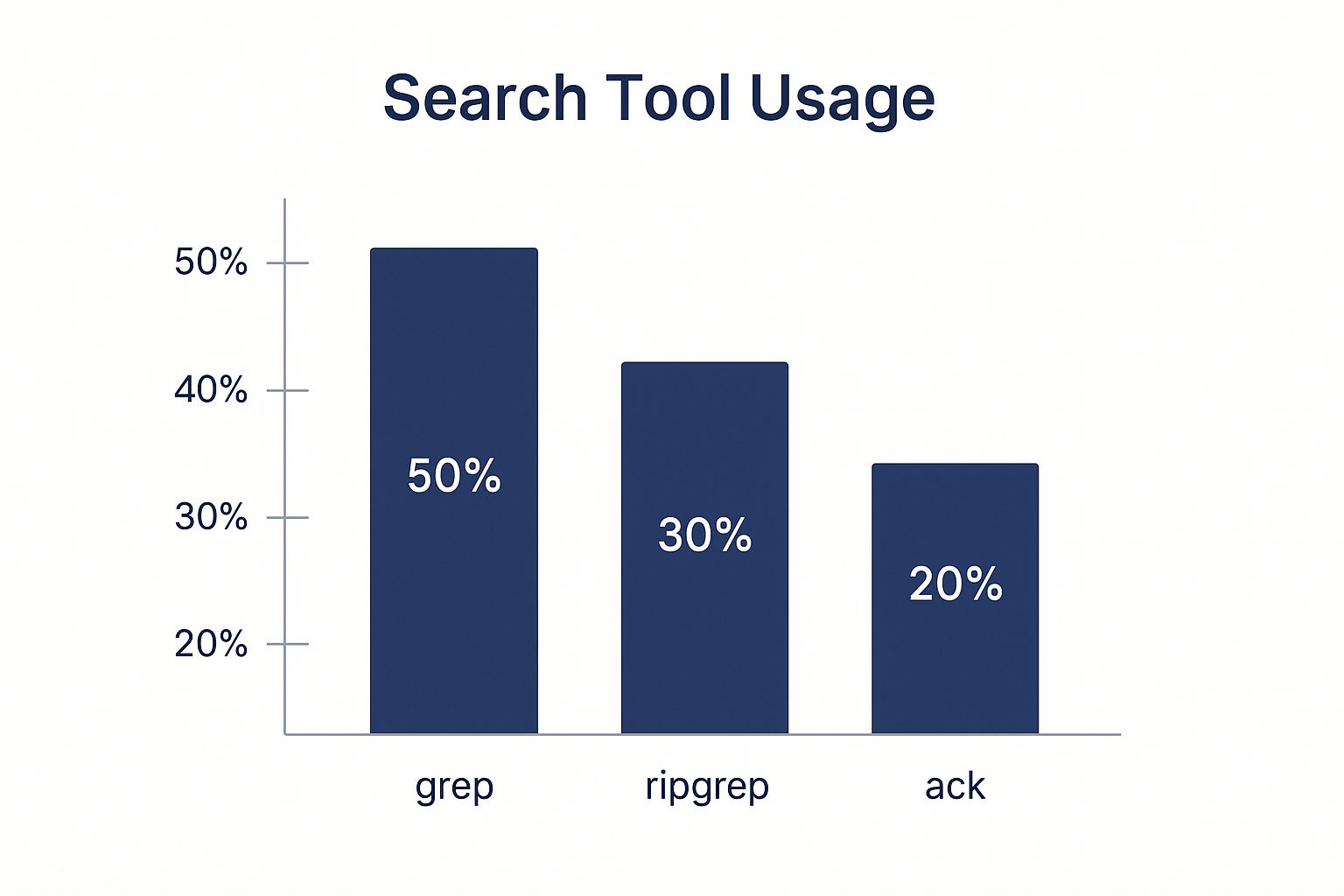Why Mastering Search In Code Transforms Your Development

Developers spend a significant portion of their time reading and understanding existing code. This makes efficient search in code crucial for productivity. Senior engineers often attest to how effective search techniques dramatically reduce problem-solving time.
This efficiency translates to faster feature delivery and quicker bug resolutions. Teams that emphasize search skills during onboarding understand the long-term benefits for their developers and project timelines.
This focus on improved coding workflows is driving innovation in tools and technologies. The fields of artificial intelligence (AI) and machine learning (ML) are seeing particularly rapid growth in this area.
The Growing Market for AI Code Tools
The global market for AI code tools, which assist developers in writing and optimizing code, was valued at approximately $6.7 billion in 2024. This market is projected to reach $25.7 billion by 2030. This growth is fueled by the increasing adoption of low-code and no-code platforms.
The Impact of Efficient Code Navigation
Effective code navigation, powered by robust search capabilities, directly impacts project timelines. A developer who can quickly locate a specific function has a significant advantage over one who spends hours sifting through files.
This difference in efficiency can be critical for meeting deadlines. Well-organized codebases, combined with strong search skills, allow developers to understand the context of code segments faster, leading to fewer errors and improved collaboration. This reduces development costs and accelerates the release cycle.
From Basic Text Search to Semantic Understanding
Search in code has evolved beyond basic text matching. Modern tools now incorporate semantic understanding. This allows developers to search based on the intended behavior of code, rather than just keywords.
Imagine searching for "calculate user engagement" and the search engine returning the relevant functions, regardless of their specific names. This is the power of semantic search. These advancements lead to more intuitive and efficient code discovery, changing how we build and maintain software. Mastering these advanced techniques is essential for any developer looking to stay ahead in the field.
Essential Search In Code Patterns That Elite Developers Use

The infographic above illustrates the current usage distribution of popular command-line search tools. grep leads with 50%, followed by ripgrep at 30% and ack at 20%. This data underscores the enduring relevance of command-line tools in a developer's workflow, even with the significant advancements in Integrated Development Environment (IDE) search functionalities.
Beyond simple keyword matching lies a realm of enhanced efficiency for developers. Regular expressions (regex) are a crucial tool for elite developers, providing the ability to search for intricate patterns and variations within code. This surpasses the limitations of basic text searches.
For instance, finding all uses of a specific function with different parameters becomes straightforward with the appropriate regex. Moreover, monitoring platforms like GitHub for specific keywords can further refine code search strategies. Services like Octolens allow you to track the usage and evolution of particular code patterns.
Scope-Aware Searching and Symbol-Based Navigation
Scope-aware searching streamlines results by considering the context within the codebase. This allows developers to search within a defined area, like a function, class, or file, significantly reducing irrelevant results and saving valuable time.
Symbol-based navigation elevates efficiency further, enabling developers to jump directly to the definitions and uses of functions and variables. This accelerates code comprehension and minimizes manual searching. For a deeper dive into structuring code for improved navigation, explore resources on code structure best practices.
To help visualize the differences between various search techniques, the table below offers a comparison based on several key criteria.
Developer's Search in Code Toolkit Comparison
This table contrasts the effectiveness of different search approaches across varying codebase sizes and languages, helping you select the perfect technique for each development scenario.
| Search Technique | Best For | Limitations | IDE Support | Learning Curve |
|---|---|---|---|---|
| Keyword Search | Simple searches, finding specific terms | Ineffective for complex patterns or variations | Universal | Easy |
| Regular Expressions (Regex) | Complex patterns, variations, flexible matching | Can be complex to learn and write | Widely Supported | Moderate to High |
| Scope-Aware Search | Targeted searching within specific areas of the codebase | Requires understanding of code structure | Most IDEs | Easy to Moderate |
| Symbol-Based Navigation | Quickly locating definitions and usages of symbols | Limited to defined symbols within the project | Most IDEs | Easy |
As shown in the table, each technique offers unique advantages and limitations. Choosing the right approach depends on the complexity of the search and the developer's familiarity with each tool.
Building a Shared Search Pattern Library
High-performing teams often curate shared search pattern libraries. These libraries house commonly used regex patterns and effective search strategies, fostering consistency across projects, reducing redundancy, and streamlining onboarding for new team members. This collaborative approach transforms code search from an individual effort into a shared team resource, maximizing productivity gains.
Combining Techniques for Maximum Impact
While individual techniques offer advantages, combining them yields substantial gains in coding efficiency. Imagine using a shared regex pattern from your team’s library, applying it within a specific scope using your IDE's search, and then leveraging symbol-based navigation to trace function calls. This synergy transforms potentially tedious searches into a swift process. Mastering these search techniques equips developers to navigate complex codebases effectively and become more proficient problem-solvers.
Conquering Massive Codebases With Advanced Search in Code

Navigating millions of lines of code can be a daunting task. Standard search methods often fall short when dealing with projects of this scale. This section explores advanced search techniques used by developers at companies like Google and Facebook to efficiently navigate their expansive code repositories. These techniques offer significant advantages over basic keyword searches.
Semantic Code Search: Understanding Intent
Semantic code search goes beyond simply matching text. It strives to understand the intent behind your query. This means you can search for code implementations based on what they do, rather than their specific names.
For example, a search for "encrypt data" might return functions using different encryption libraries, even if those functions aren't explicitly named or labeled as "encryption" functions. This intelligent approach simplifies the process of finding relevant code. Understanding code review processes can also inform effective search strategies. For more insight, consider reviewing this article on Code Review Best Practices.
Dependency-Aware Searching: Navigating Relationships
Dependency-aware searching changes how you explore relationships between different components. It allows you to quickly identify all components that depend on a particular module or function.
This is incredibly useful for refactoring or debugging, as it helps you understand the potential impact of changes across your codebase. This interconnected perspective simplifies complex projects and makes code maintenance more manageable. For more on managing complex projects, consider reading about the challenges of monorepos.
Contextual Search: Reducing Cognitive Load
Constantly switching between different project areas adds mental overhead. Contextual search tackles this by narrowing down search results based on your current working context.
If you're working within a specific module, for instance, the search will prioritize results from that module and its related dependencies. This focused approach reduces irrelevant results, helping you find what you need quickly. This localized search also minimizes the mental effort required to sift through unrelated files.
Real-World Impact and Case Studies
These advanced search techniques have a substantial impact on developer productivity. Case studies from major open-source projects show how these tools can turn days of tedious searching into minutes of targeted navigation. This efficiency leads to faster development cycles and quicker problem resolution.
By reducing time spent searching, developers have more time for coding and problem-solving. It's worth noting that Google holds a significant market share in search, roughly 89.65% worldwide. This influences how developers approach searching for solutions, libraries, and code snippets online, often relying on Google. More detailed statistics can be found here. This reliance underscores the importance of effective search strategies, both within and outside the codebase. These advanced techniques are increasingly critical for navigating the large codebases and projects of today.
Unlocking Hidden Search in Code Powers Within Your IDE
Your IDE is more than a simple text editor. It’s a powerful search engine designed specifically for your codebase. While many developers stick with basic keyword searches, learning your IDE's advanced search features can drastically improve your productivity. This section explores some of these functionalities and how they can optimize your workflow.
IDE-Specific Superpowers
Different IDEs have their own strengths. VS Code, for example, offers exceptional multi-cursor selection. This allows you to modify recurring code patterns rapidly. Instead of individually searching and replacing each instance, you can select every occurrence at once and edit them simultaneously.
IntelliJ IDEA's structural search is another valuable tool. Going beyond simple text matching, it enables you to find code antipatterns based on their structure. This is particularly helpful for identifying potential bugs or areas for refactoring that a standard text search might miss. IntelliJ IDEA truly shines in this aspect.
Eclipse's call hierarchy visualization provides a powerful way to understand complicated code interactions, especially for those working with large or legacy systems. By mapping out every function call related to a selected method, it provides a clear overview of dependencies and control flow.
Keyboard Shortcuts: Navigating at Lightning Speed
Experienced developers often rely on keyboard shortcuts for quick code navigation. Mastering these shortcuts can considerably improve your search efficiency. Learning the keybindings for actions like "Find in Files," "Go to Definition," and "Find References" will significantly reduce the time you spend searching.
Customizing Search Configurations: Reducing False Positives
Sifting through false positives can be one of the most frustrating aspects of code searching. Customizing your search settings can help minimize this. For example, excluding certain directories (like test files or generated code) from your searches will lead to more accurate results.
To help you choose the right IDE for your project, we've compiled a table comparing the search capabilities of some popular options. This table offers a quick glance at their strengths and weaknesses in various search functionalities.
Search in Code: IDE Feature Battlefield This table highlights the strengths and weaknesses of various IDEs in relation to their search capabilities.
| IDE | Regular Search | Regex Support | Symbol Navigation | Structural Search | Search Across Projects | Performance |
|---|---|---|---|---|---|---|
| VS Code | Excellent | Excellent | Excellent | Good | Excellent | Excellent |
| IntelliJ IDEA | Excellent | Excellent | Excellent | Excellent | Excellent | Good |
| Eclipse | Good | Good | Excellent | Moderate | Good | Moderate |
| Sublime Text | Excellent | Excellent | Good | Limited | Moderate | Excellent |
| Atom | Good | Good | Good | Limited | Moderate | Moderate |
As you can see, each IDE offers a unique set of search features. Selecting the right IDE depends on the specific needs of your project and your preferred search methods.
By exploring and customizing your IDE's search capabilities, you can significantly enhance your coding efficiency. This frees up your time and energy to focus on problem-solving and other important aspects of development. Mastering your IDE's search functionality is a worthwhile investment that will continue to benefit you throughout your development career.
How AI Is Revolutionizing Search In Code Experiences

The way developers search code is changing. Thanks to artificial intelligence, tools like GitHub Copilot and Sourcegraph are going beyond simple keyword matching. They now employ natural language processing (NLP) to understand the intent behind a search. This marks a significant improvement in how we navigate and understand code.
Instead of searching for specific function names, developers can describe what they need conceptually. For example, you could ask "how to validate an email address in JavaScript." The AI will then suggest relevant snippets, even if those snippets aren't explicitly labeled as "email validation." This simplifies the process of finding the right solution.
AI-Powered Pattern Recognition and Vulnerability Detection
AI-driven tools can identify implementation patterns based on conceptual descriptions, even within large codebases. This helps developers find solutions to complex problems faster, without having to manually search through countless files. Furthermore, these systems can proactively detect potential security vulnerabilities through an analysis of dependency chains. This automated analysis improves code security by catching issues often overlooked during manual reviews. You might find this helpful: How to master static code analysis.
These tools can significantly impact a development team’s velocity. Companies adopting AI-powered code search are seeing noticeable decreases in the time needed to develop and deploy new features. This acceleration increases overall productivity and allows teams to deliver products to market faster.
Refactoring Opportunities and Development Velocity
AI-powered code search also suggests refactoring opportunities. By analyzing existing code, it can identify areas for improvement. This streamlines codebases and improves maintainability, which is particularly useful in large, complex projects where identifying such opportunities manually can be a daunting task.
The Future of AI in Code Search and Related Markets
While these AI-powered tools offer significant advantages, they do have some limitations. Current models may struggle with highly nuanced or specialized code. However, the technology is constantly evolving. As AI models become more advanced, they'll be able to handle increasingly complex search queries and offer even more valuable suggestions.
Interestingly, the growth of search in code reflects trends in other search-related fields, like SEO software. The global SEO software market was estimated at $74.82 billion in 2024 and is projected to reach $84.94 billion in 2025. This highlights the growing importance of effective search capabilities across diverse fields. You can find more detailed statistics here. The future of AI in code search looks promising, with continued advancements poised to further improve the developer experience.
Command-Line Search In Code Tools That Beat Your IDE
For specific search tasks within code, command-line tools often outperform IDEs. This article explains why many skilled developers frequently use tools like ripgrep (rg), Silver Searcher (ag), and fd from the command line, even with powerful IDEs readily available. Through comparisons using real-world codebases, we’ll explore how these tools can significantly improve your search efficiency.
Why Choose Command-Line Tools?
Command-line tools are designed for pure speed and efficiency when searching through code. Benchmarks often reveal these tools performing hundreds of times faster than integrated IDE search features, especially when handling massive codebases or complex searches.
These tools also offer advanced filtering and search capabilities often unavailable or cumbersome to use within IDEs. This flexibility empowers developers to create powerful searches that target specific files, patterns, and code structures, significantly reducing noise in the results.
This increased speed and flexibility result in a considerable reduction in time spent searching, allowing developers to concentrate more on writing and understanding code. This efficiency gain can be especially significant in larger projects or when collaborating with other developers.
Mastering Ripgrep, Silver Searcher, and fd
Ripgrep is known for its impressive speed, regularly outperforming other command-line search tools in benchmarks. Its straightforward syntax and intuitive options make it easy to create powerful searches quickly.
The Silver Searcher, another popular choice, offers similar performance advantages and useful features like automatically ignoring .gitignore files. This streamlines searches by excluding unnecessary files and folders.
Fd, a user-friendly alternative to the traditional find command, focuses on ease of use and a cleaner output. It uses simpler patterns by default and provides colorful output for improved readability in the terminal.
| Tool | Speed | Features | Ease of Use |
|---|---|---|---|
| ripgrep (rg) | Excellent | Robust filtering, multiple file types | Moderate |
| Silver Searcher (ag) | Excellent | .gitignore integration, binary file skipping | Moderate |
| fd | Very Good | Simple patterns, colored output | Easy |
Crafting Powerful Search Commands
Learning to construct efficient search commands unlocks the full potential of these command-line tools. For example, searching within specific file types (like *.js or *.py) filters out irrelevant results.
Excluding directories like node_modules or vendor further narrows the search scope, dramatically increasing speed and relevance. These tools also allow for compound searches, combining multiple criteria, offering a level of control and precision often lacking in IDEs.
Here are some example command patterns:
- Search for "functionName" in all JavaScript files:
rg "functionName" *.js - Exclude the "node_modules" directory:
rg "functionName" -g "!node_modules" - Case-insensitive search:
rg -i "functionName"
Integrating With Your Development Environment
These command-line tools can be integrated seamlessly into your existing workflow. Many IDEs have terminals built-in, allowing you to run these commands directly within the IDE. You can also often configure your IDE to use these tools for its internal search functionality, enhancing its capabilities without switching contexts.
This integration combines the benefits of both IDE features and the raw power of command-line tools, creating a highly efficient search workflow. This, in turn, speeds up development and improves code comprehension.
Ready to optimize your code searching and experience the speed and efficiency of a streamlined workflow? TreeSnap helps you manage and navigate your codebase with speed, allowing you to focus on what matters most: building great software. Visit TreeSnap today to discover how it can improve your development process.